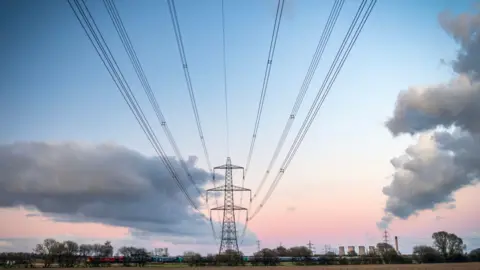Electricity supplier Power NI announces price increase
 Getty Images
Getty ImagesNorthern Ireland’s largest electricity supplier Power NI has announced its first price increase in more than a year.
Household electricity prices will rise by 4% from next month adding about £38 onto the typical household annual bill, which will rise from £951 to £989 in December.
Power NI, which is the only regulated electricity supplier in Northern Ireland, has about 500,000 household customers.
It comes after four price decreases in a row.
'Not unexpected'
 Getty Images
Getty ImagesEarlier this year, prices were cut by 6.3% in April.
Director of Power NI's customer solutions, William Steele, said wholesale prices remain high and that “significant increases in third-party market operation and network related costs have regrettably necessitated a tariff increase”.
“In these challenging times, we have held off changing prices for as long as possible and we have been able to keep our tariffs below the equivalent GB and RoI average,” he added.
The move was not unexpected, as electricity costs have recently increased in the rest of the UK.
Leigh Greer, head of security of supply and markets regulation at the Utility Regulator said: “The main reason for this tariff change is due to an increase in costs related to the market and operation of the electricity network.
"As we continue to strive to meet government climate change targets, and to ensure security of supply, there has been a need to invest in grid infrastructure to facilitate renewable energy sources.
“The average price of regulated electricity for households in Northern Ireland is around £80 cheaper per year than in Great Britain, and around £180 cheaper than in [the Republic of] Ireland,” she added.
'Additional costs'
Meanwhile the Utility Regulator has approved NIE Networks plan to upgrade Northern Ireland’s electricity grid.
That will mean additional costs for business customers, particularly large energy users.
NIE Networks owns the network of lines, poles and substations that takes electricity from power stations to homes and businesses.
The grid needs a major investment to deal with the impact of decarbonisation, which will mean more demand for electricity and more renewable generation.
The regulator has approved total spending of £2.23bn over the next six years, a 13% reduction on NIE Networks’ original request of £2.55bn.
Grid costs account for about a quarter of what consumers and business’s pay in their electricity bills.
The grid upgrade will mean large energy use businesses will see their grid costs rise by 8%-15% which could increase their total bill by 4%.
There will be less impact on smaller businesses and no material change for household bills.
'Eye-watering profiteering'
Director of price controls at the regulator, Elaine Cassidy, said: "This investment package will facilitate the transition away from fossil fuels to renewable energy sources.
"It will also secure a robust and resilient network.
"Our central aim was to strike the right balance between making sure that consumers benefit and are protected, while providing the necessary investment."
However, the outcome has been criticised by Manufacturing NI chief executive Stephen Kelly who said "the costs of decarbonisation are being placed solely on those who create jobs".
"It is not only our manufacturers and those that rely on them who will be hurt. Our food retailers and indeed our hospitals and water provider are amongst our largest energy users so all consumers will see the pass-through of these costs," he added.
He said the regulator was not doing enough to protect consumers from "eye-watering profiteering" in the wholesale electricity market.
